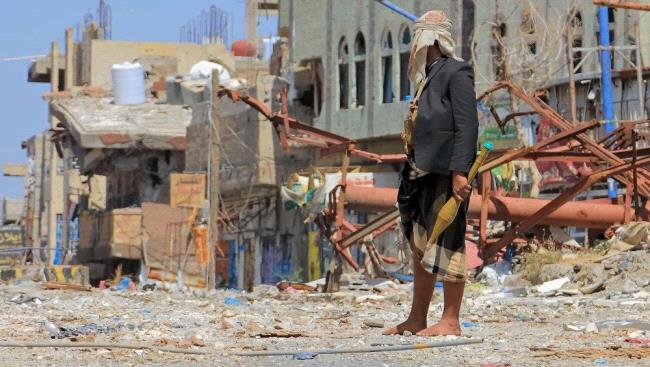

25 أغسطس, 2025 10:00:49 م

A Yemeni soldier pauses in the fight against Houthi militias in South Yemen
Torrential Rains Have Flooded Aden and Parts of Lahij, Submerging Entire Neighborhoods and Causing an Unknown Number of Deaths
August 25, 2025 Michael Rubin.
While veterans of the U.S. Agency for International Development (USAID) and those who received largesse from the wasteful group lamented its fall, few within the State Department shed tears; they understood that USAID workers were often arrogant and wasteful, and seldom sought to coordinate with mission goals, believing their own pet priorities should take precedent. There was rarely a USAID project for which the agency did not first require a multimillion-dollar consultant study, usually unnecessary but awarded to a favored client or firm formed by USAID alumni.
Even as Secretary of State Marco Rubio delivered the coup de grâce for the agency, he recommitted the United States to providing humanitarian aid. “Even with the reforms we’ve put in place and what we’re suggesting as changes to our foreign aid,” Rubio told the Senate, “we still will provide more foreign aid, more humanitarian support than the next ten countries combined, than the entire OECD, and far more than China.”
Today, Yemen—and specifically, defeat of the Iran-backed Houthis—is at the forefront of U.S. national security.
While USAID alumni exaggerate both their impact and their niche relative to nongovernmental organizations, there was little USAID did that other charities could not or did not. What Rubio did, essentially, was return foreign assistance to the basics: blankets, bombs, and bribes. Within the foreign aid debate, no one in Washington objected to emergency relief after hurricanes, earthquakes, or similar natural disasters. What fiscal hawks did object to was subsidizing the failures of governments to build their own infrastructure. In countries like Nigeria and Somalia, or territories like Gaza and Iraqi Kurdistan, local governments saw foreign aid as a green light to embezzle their own customs and tax revenue without losing capacity.
Today, Yemen—and specifically, defeat of the Iran-backed Houthis—is at the forefront of U.S. national security. If the Houthis win in Yemen, not only would they impede freedom of navigation through the Bab el-Mandeb but also, should they conquer South Yemen, Iran, its proxies, or its allies would control 1,500 miles of coastline from Pakistan to Yemen, including the strategic Strait of Hormuz.
Yemen’s Southern Transitional Council is at the leading edge of continued resistance against the Houthis. Unlike the Internationally Recognized Government, an entity that largely exists on paper and whose ministers sit in Saudi Arabia or Egypt, the main political entity in southern Yemen controls and governs territory. Other states and groups also show feeble commitment to stop the Houthis. President Donald Trump cut a separate deal with the Houthis in exchange for an end to targeting U.S. ships. Saudi Arabia, too, prefers to appease the Houthis to keep the quiet along Yemen’s more than 800-mile border with the Saudi Kingdom. Oman plays a double game; Muscat views a strong southern Yemen as more contrary to its interests than a chaotic Yemen or a Houthi victory. Islah—the local Muslim Brotherhood affiliate that sits in the internationally recognized Presidential Leadership Council—plays a similar game. It prefers to empower the Houthis and Al Qaeda in the Arabian Peninsula rather than accept local rule in southern Yemen.
Yemen receives the tail end of the monsoons that sweep India and Bangladesh like clockwork. On August 24, 2025, torrential rains flooded Aden and parts of the Lahij government, submerging entire neighborhoods in Al-Heswa and Bir Ahmed in northern Aden, destroying hundreds of homes; the death toll remains unknown.
If Rubio is serious about sending aid where it is needed, he and Secretary of Defense Pete Hegseth should immediately dispatch assistance to Aden and Lahij, air-dropping assistance and coordinating with the local Southern Transitional Council to send experts and rescue workers into Aden.
[The U.S.] should immediately dispatch assistance to Aden and Lahij, air-dropping assistance and coordinating with the local Southern Transitional Council to send experts and rescue workers into Aden.
Not only would this alleviate an immediate humanitarian need, but it also would show Yemenis that casting aside the Houthis brings safety, security, and meaningful interaction with the outside world. It also would show the hypocrisy of now silent partisans who cry wolf about humanitarian disaster if military action cuts off Houthi supplies through the Port of Al-Hudaydah or other means. Finally, it would reinforce the only secure and functioning region in Yemen.
Washington should not take for granted Southern Transitional Council control and the security it brings. Islah and other northern politicians seek its failure and constrain its ability to operate in order to immunize themselves from any juxtaposition with a successful group. Natural disasters are legitimacy tests. The Iranian shah’s failure to respond effectively to the 1978 Tabas earthquake delegitimized him and catalyzed Ayatollah Ruhollah Khomeini’s efforts to oust his regime.
A continued anemic response from Washington will show not only the emptiness of Rubio’s promises that the United States will remain responsive to humanitarian need but also demonstrate a lack of U.S. strategic foresight. If the United States does not support its local partners in Yemen, it may find that it no longer has any meaningful hooks upon which it can hang its anti-Houthi policies.